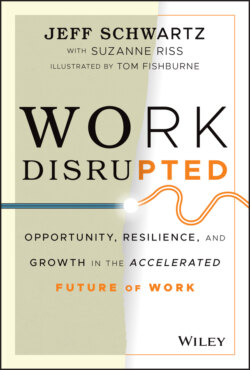Читать книгу Work Disrupted - Jeff Schwartz - Страница 8
Introduction
ОглавлениеThe difficulty is not so much in developing new ideas as in escaping from old ones.
—John Maynard Keynes
I've been traveling somewhere in the world for my work every month—often every week—for the past 20 years; that is, until Covid-19 stopped me in my tracks. Suddenly, I had to pause. All at once, the packing, the rushing, and the business travel ended. I had no idea that my trip to Israel in early March, leading a global panel on the future of work, would be the last time I would board an international flight in 2020. A few days after returning home to New York City from Tel Aviv on March 3, my workplace relocated from the Deloitte Consulting offices at Rockefeller Center to my small home office on the Upper West Side of Manhattan. As I sheltered in place, along with the rest of the world, tracking the sobering devastation wrought by the pandemic, I had the chance—perhaps for the first time in my career—to stay in one place for longer than a few weeks and reflect on the changes underfoot and ahead.
My work on this book had been well underway before the global pandemic took hold in early 2020. However, there's no doubt that it brought a new sense of urgency to my exploration of the future of work that had begun seven years earlier. The need to shift to new ways of working, new frames, new expectations, and new possibilities was accelerated by the pandemic. At a time that technologies, including artificial intelligence, are ubiquitous, and, to some, represent a threat to jobs and livelihoods, we have also witnessed our fundamental vulnerability as humans exposed by a virus that has already killed more people in the United States than all wars since World War II. What I have discovered about the future of work, as a global and U.S. pioneer and leader for the Future of Work practice with Deloitte Consulting, in interviews with dozens of leading experts in the field, and in my conversations with business leaders across the globe, is that, above all else, it celebrates our essential human capabilities—innovation, creation, ingenuity, entrepreneurship, empathy, caring, and relationships.
Though the future of work is shorthand for some for “the robots are taking our jobs,” what has emerged for many is a growing belief that innovation and creativity will indeed rule the day. We can only automate processes, reduce costs, and increase speed so much—eventually we will need to create something new. We will need to innovate. And that's what many of us did, in ways small and large, during the Covid-19 outbreak. I continued to work with clients and colleagues around the world, no longer in person but over Zoom, WebEx, and similar platforms, while spending every evening and weekend researching and writing this book. This was a time to take stock, feel the discomfort of uncertainty, adapt, and seek out opportunities to do things in new ways. Very quickly, with my colleagues at Deloitte, we figured out how to continue to do our work, remotely, and better. As with the adoption of any new technology, we started by lifting and shifting what we'd done before, to Zoom, Teams, Slack, and other collaborative technologies. Then we saw we could do more. Things we thought we could never do remotely, we did, such as launching large technology systems for organizations without having hundreds of consultants onsite. We discovered we could deliver successful, interactive, online workshops with breakout groups; collaborate on virtual whiteboards; and even brainstorm virtually. We also learned more about each other as we worked from our homes. As I would share with my teams, if we don't hear children and dogs in the background, something is missing. Our lives should be evident in the flow of our work. That's something we don't want to lose as we move into our new normal.
